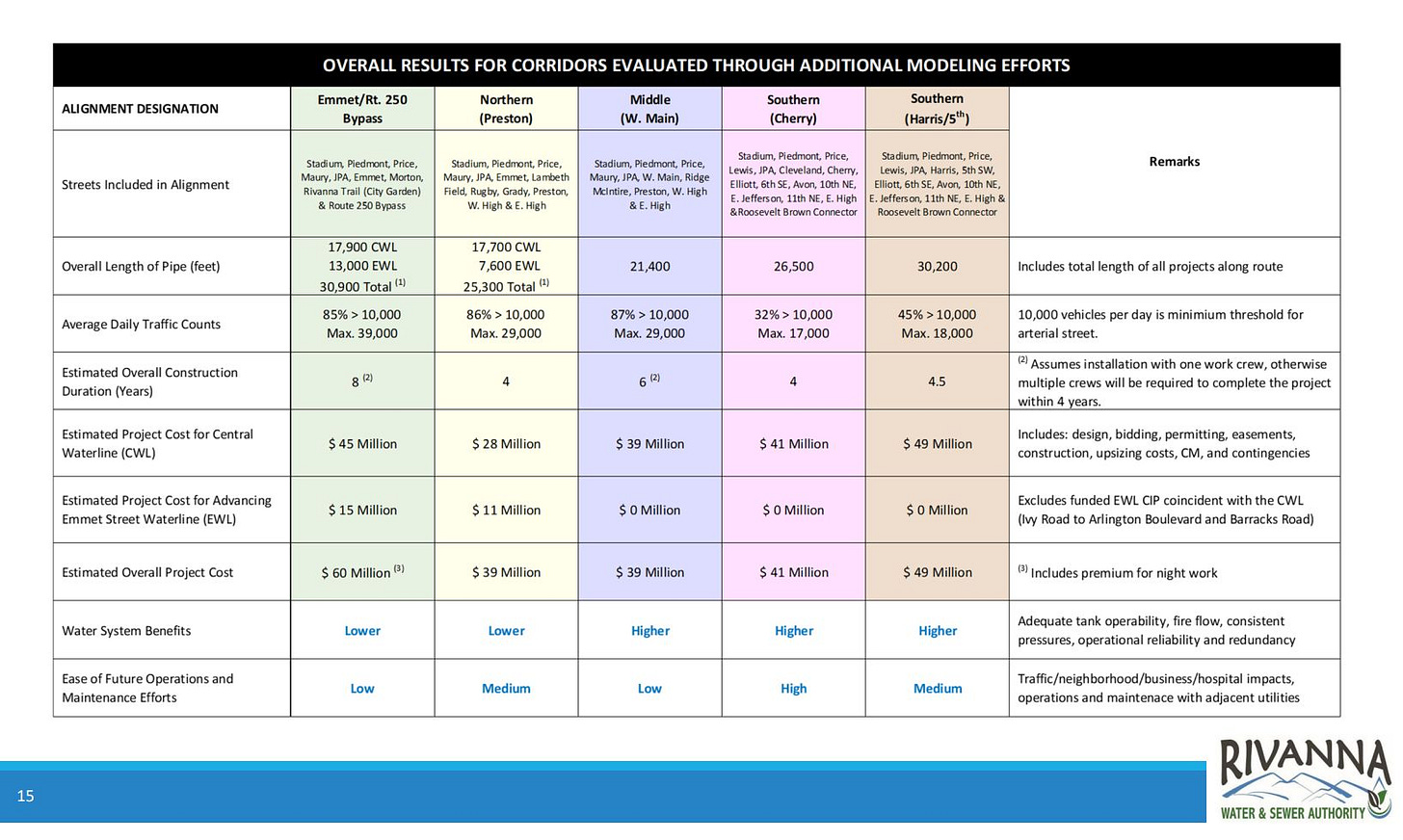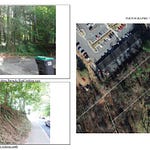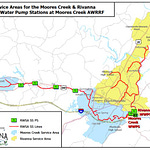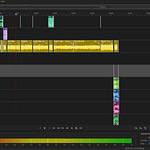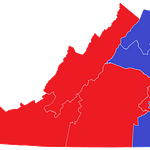Today is the antepenultimate day of Fiscal Year 2022, and we’re counting down the hours to when the metaphorical ball will drop in Richmond marking the beginning of FY2023. Are you prepared? Feel free to review previous installments of Charlottesville Community Engagement to revisit the hundreds of stories written in the tinfopast 12 fiscal months. Or head on over to Information Charlottesville to see I’ve been able to cover at least. The “I” here is Sean Tubbs and thanks for reading.
On today’s program:
Charlottesville City Council gets details on a water infrastructure project in advance of a vote today by the Rivanna Water and Sewer Authority
Many people had an opinion about whether the name of the regional library system but it’s up to elected officials to decide on a change
How much trash was processed in Virginia last year? The Department of Environmental Quality has a new report.
And about two hundred people attended an open house on the forthcoming update of the city’s zoning code
Today’s first shout-out goes to WTJU
In today’s first Patreon-fueled shout-out: Algorithms know how to put songs and artists together based on genre or beats per minute. But only people can make connections that engage your mind and warm your heart. The music on WTJU 91.1 FM is chosen by dozens and dozens of volunteer hosts -- music lovers like you who live right here in the Charlottesville area. Listener donations keep WTJU alive and thriving. In this era of algorithm-driven everything, go against the grain. Tune in and support freeform community radio on WTJU Consider a donation at wtju.net/donate.
Around 200 people turn up at Pavilion to get details on the city’s zoning process
When the Cville Plans Together Initiative began in early 2020, there were plans to engage people at a series of meetings while the work of crafting an affordable housing plan and the Comprehensive Plan update was conducted. However, the pandemic forced all of that public engagement work to go online.
Council adopted the Affordable Housing Plan in March 2021 and the Comprehensive Plan last November. Both call for additional residential density across the city and an update of the zoning code is the next step.
This time around, people can meet in large numbers, and an open house was held yesterday at the Ting Pavilion where attendees could get a look at the new Diagnostics and Approach Report for the zoning rewrite. People could go through the entire process to date and ask questions of consultants, city staff and each other. I dropped by briefly and spoke with James Freas, the city’s Director of Neighborhood Development Services since last September. (read the Zoning Diagnostic and Approach report)
“We’ve just released the report about two weeks ago and what we’re really looking for is where can we answer clarifying questions, where can we answer questions about what we’ve already shared and what’s in there, and what else should we be considering?” Freas said.
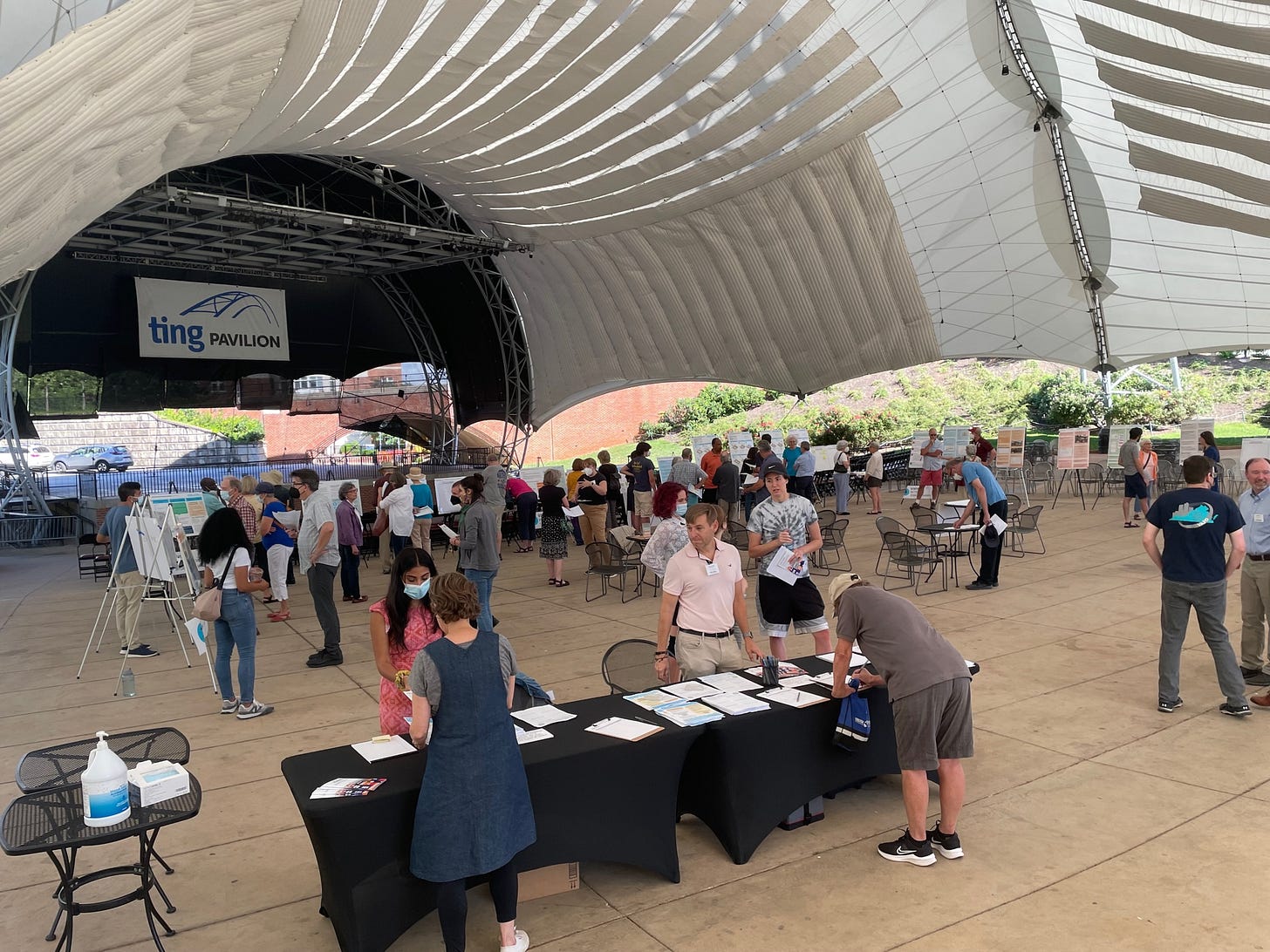
Freas said even half an hour into the event, he could see how community engagement will be different for this phase of the Cville Plans Together initiative.
“If you look around, people are having conversations,” Freas said. “You can’t do this on a Zoom environment. So it’s really exciting to be back in person talking to people face to face, introducing ourselves, having a conversation, and even if we don’t agree, because we’ve met and talked face to face, we’re able to walk away in a move civil environment.”
Freas said the city will collect comments through August, and he will be visiting various neighborhood associations to explain the idea. Then the diagnostics report will be finalized in September for the Planning Commission and Council to review, followed by the actual rewrite.
DEQ releases solid waste report
More than 22.7 million tons of solid waste were sent to processing facilities in Virginia last year, with nearly 5.4 million coming from out of state. That’s according to the annual solid waste report for 2021, released yesterday by the Virginia Department of Environmental Quality.
“The total amount of solid waste received increased by one percent or 225,524.95 tons compared to 2020,” reads the report.
However, the amount that came from another jurisdiction dropped by 5.28 percent. About 44 percent of out-of-state came from Maryland, 18.7 percent came from New York State, and 14 percent came from Washington D.C.
Around 11.8 percent of the waste was incinerated and 73 percent went into landfills. Another 8.24 percent was recycled. All but one of Virginia’s 204 permitted solid waste facilities submitted reports.
Locally, the landfill operated by Louisa County buried 23.1 tons of solid waste and has 10.2 years left of capacity. Two transfer stations included in the reporting are the Ivy Materials Utilization Center in Albemarle County as well as the Nelson County transfer station.
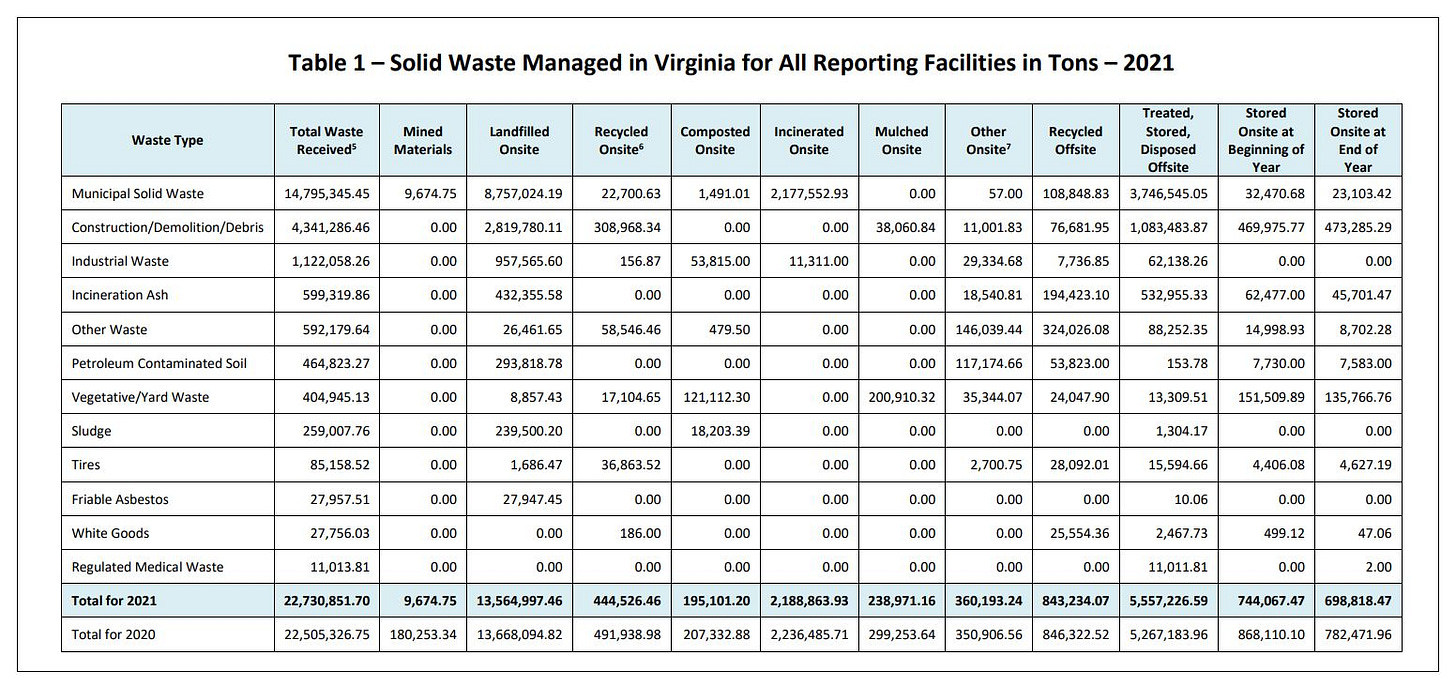
Speakers express multiple views on renaming of library system
The Board of Trustees of the Jefferson-Madison Regional Library met yesterday at the Northside Library on Rio Road for the usual things such as a five year plan and a budget. But the main item throughout the meeting was whether the system’s name should be changed.
“I don’t expect that we will have a vote on the issue of the library’s name change today,” said Thomas Unsworth, the chair of the JMRL Board. “In fact the Board would be able to call a public hearing if need be to collect further feedback from commentary on that issue.”
The public comment period came at the beginning of the meeting before comments on the topic from JMRL Director David Plunkett. The topic came up at the last trustee meeting in May when Myra Anderson asked for the change because Thomas Jefferson and James Madison owned people as enslaved workers. We’ll hear from Anderson again in a minute.
The first speaker identified himself as Nickolaus Cabrera and said he was a rising senior at the University of Virginia as well as president of the school’s chapter of Young Americans for Freedom.
“We lose our future when we burn our past,” Cabrerra said. “What you all are considering today is a direct burning of our past. Why is this discussion happening? On what basis?”
Cabrerra said the name change would do nothing more than promote a “woke agenda” and this would be an example of censorship. The next several speakers sided with this view. Others did not, including Gloria Beard of Charlottesville.
“It’s time for a change for all people and I hope you all consider what we’re trying to bring across to you,” Beard said. “It’s time to change so all people feel like this community is for everybody.”
Others felt Jefferson and Madison’s legacy was too important not to honor.
“Without Jefferson we would not have the freedoms we have so that is just so important for people to research, come to libraries that are full of books,” said Ann McLean of Richmond. “Yes, he loved books.”
McLean said the Declaration of Independence was more important than the works of Shakespeare, the Magna Carta, and the writings of Cicero.
“Without the principles set forth in the Declaration of Independence, we would have no rights and no liberties and be completely at the mercy of the government,” McLean continued. “Which we do not want to be!”
Myra Anderson described herself as the president of the Reclaimed Roots Descendants Alliance and a descendant of enslaved laborers.
“Six of my ancestors were sold on the auction block in 1829 at the second estate sale of Thomas Jefferson,” Anderson said. “At the time the Declaration of Independence was written and it was declared that all men are created equal, my sixth great grandfather and grandmother were enslaved at the time at Monticello.”
Anderson said libraries should be inclusive spaces and the name should change to reflect the updated values of the system. She said to her, the name Jefferson does not just conjure up greatness.
“It represents the trauma, the oppression, the pain, and the part of Jefferson that most white people want to gloss over when they talk about his greatness, but unfortunately that’s the part that put Black people on a trajectory of struggle,” Anderson said.
Anderson said the precedent for such a change was set locally when the health district dropped his name last year.
Director’s report
After the public comment period was over, Plunkett gave his report on how the name is currently codified and how it might be changed. He said state law for regional library boards deal with how trustees are appointed and the rules for spending money. There’s no mention of who gets to name them.
Plunkett said the current name has informally been in place since 1972 when the regional system was created to pool resources across a wider area.
“The big reason though that Charlottesville, Albemarle, Greene, Louisa, and Nelson joined forces to create JMRL was because of state aid funding which was amplified in the 70’s,” Plunkett said. “Basically the state incentivized localities to get together and share their resources in order to provide library services.”
The original agreement from 1972 did not yet include Greene County, and Plunkett said it was originally called the Thomas Jefferson Regional Library.
“The library board heard a comment from a library board member who made a plea to them to change the name from the Thomas Jefferson Regional Library to the Jefferson-Madison Regional Library,” Plunkett said.
Plunkett said that board member wanted to recognize the “special friendship” between Madison and Jefferson. He noted Madison did not live in the service area now operated by JMRL.
Greene County joined in 1974 and the name was officially changed in an amended agreement. Plunkett said he’s sought legal advice about who gets to change the name.
“The legal counsel that the library board has received is that the authority for changing the library name rests with member jurisdictions, with Charlottesville, Albemarle, Louisa, Greene, and Nelson,” Plunkett said.
Plunkett said the agreement is overdue for its mandatory five-year review and a five-member committee with one appointed by each jurisdiction should begin that work and consider a new name as part of that process.
“If there were changes made to the regional agreement at that point, they would need to take them back to their Boards of Supervisors or City Councils to vote on before that could come back as an amended regional agreement,” Plunkett said.
Plunkett said the Blue Ridge Health District did not have to ask for permission to make a change and it was made administratively. He added Albemarle County Public Schools have a policy in place regarding school names (learn more). The University of Virginia has a Namings & Memorials committee.
Board discussion
During the Board discussion, Trustee Lisa Woolfork of Charlottesville noted the library was not named to honor the two former presidents, but their friendship.
“It wasn’t about ‘Oh, look what they did for the Bill of Rights and the Declaration and et cetera,” Woolfork said. “It was, ‘these guys are friends!”’
Woolfork noted that Charlottesville’s Unitarian church recently dropped Jefferson’s name from its official name.
“I really do believe that we are in a moment where our democracy is being challenged in a variety of ways and I feel as though we have the opportunity to make some true progress to reflect some of the growth that Charlottesville has made,” Woolfork said.
One of Albemarle’s trustees, Michael Powers, said at issue is that different people view as the primary legacy of Jefferson.
“I think it’s clear to me that many people primarily associated Jefferson and Madison with their practice of slavery, but it’s also clear that whatever the origin of the name was at the time, over the last 50 years many people have come also to primarily associate these figures with powerful and fundamental American values, principles and ideals,” Powers said.
Powers said the JMRL Board has to take both considerations into account and he spent some time defending how others have sought to defend Jefferson’s legacy. He cited the 14th Amendment of the U.S. Constitution as the main legal tool used in the Civil Rights movement.
“So we hear in the 14th amendment, equal protection for life, liberty, they are very familiar echoes of Jefferson’s ‘All men are created equal’ and ‘life, liberty, and the pursuit of happiness,” Powers continued.
JMRL Chair Thomas Unsworth said while the JMRL can’t directly change the name, they can make recommendations or suggestions to local officials as part of the agreement review.
Woolfork was clear that she feels the name must change and she resisted framing the issue as one of two equal sides.
“It seems to me that that true energy of what a library does and brings and provides should be robust enough and substantial enough that we can serve our services areas and provide the things we continue to provide and not being called Jefferson Madison will not impede our ability to do that,” Woolfork said.
The trustee from Louisa County pointed out that two of the five localities have already voted on resolutions opposing a name change. Neither resolution in either Greene or Louisa specified any further action. (Louisa Supervisors unanimously oppose name change, June 9, 2022)
The trustee from Nelson County said she was concerned about the resolutions.
“They put that out before even hearing what the other people in the area,” said Aleta Childs.
The Board had a long discussion of the matter and in the end opted to pick up the conversation at its next meeting in July. By then, Tony Townsend of Albemarle will be the chair.
“My agenda here is to make sure that the area’s most inclusive, diverse, and free resource doesn’t get sidetracked or handicapped by this discussion,” Townsend said. “I think it’s a good discussion. I think it needs to happen. I think we can probably come up with a plan that will allow everyone to have at least input.”
Townsend said the process is just beginning.
Woolfork said she wanted to know if Louisa and Greene would leave the regional system as a result.
“Are they that committed to their adulation of Jefferson and Madison that they will just say ‘we don’t want to have a library with you anymore, thanks, and nice knowing you,’” Woolfork asked.
The JMRL Board of Trustees next meets on July 25 at 3 p.m.
Second shout-out is for LEAP’s new Thermalize Virginia program
In today’s second Patreon-fueled shout-out: Have you been thinking of converting your fossil-fuel appliances and furnaces into something that will help the community reduce its greenhouse gas emissions? Your local energy nonprofit, LEAP, has launched a new program to guide you through the steps toward electrifying your home. Thermalize Virginia will help you understand electrification and connect you with vetted contractors to get the work done and help you find any rebates or discounts. Visit thermalizeva.org to learn more and to sign up!
RWSA to vote today on Central Water Line project
Today the Board of Directors for the Rivanna Water and Sewer Authority will meet to select an alignment for a five mile pipeline that the organization says is necessary to help secure drinking water infrastructure. Last week, Charlottesville City Council got a briefing on the project. (view the presentation)
“So we call it the Central Water Line project because it was recommended to be located in the central portion of the city to provide the greatest water benefit to our regional water supply system,” said Bill Mawyer, the executive director of the Rivanna Water and Sewer Authority.
Mawyer said planning dates back to a drought in 2002 that led to a long discussion about how to expand the community water supply plan. That involved expansion of the Ragged Mountain Reservoir by building a new earthen dam, as well as an upgrade of the Observatory Water Treatment plan.
This Central Water Line is to transfer water to a location in Pantops.
“We realized later, it was not part of the original Community Water Supply plan, that we needed to have a large pipe coming away from the Observatory Treatment Plant so that we can distribute that water to all parts of the city and the county, the urban water area as we call it,” Mawyer said.
The current cost share is a 52 to 48 percent split with the Albemarle County Service Authority picking up the larger share. Various versions of this pipeline have been considered in the past to increase capacity, and a report released last year called the Urban Finished Water Master Plan recommended this central pipe through the city.
“If we expand the water treatment plant and we replace the raw waterline to get it to the treatment plant, it has no benefit if we can't put that water out into the system,” Mawyer said.
Mawyer said the work would be done in segments of several hundred feet at a time with most of the work underneath city streets.
“We expect the schedule to be from 2024 through 2028,” Mawyer said.
Mawyer said the RWSA has presented to six neighborhood associations along the route and mailed out information to every parcel on the way. He said that led to another visitation of the five alignments and other alternatives that had been examined. One of the alignments would have used the Route 250 bypass but that would have taken eight years.
“Work on the bypass was going to be quite a challenge [and] that likely would have to be completed at night due to the impacts on traffic,” Mawyer said.
Other alignments included Preston Avenue, West Main, and along Harris Street and Fifth Street Extended. Mawyer said the latter got further attention during the neighborhood meeting phase.
“Now, when we had our neighborhood meetings, they said, well what about going down Harris Street all the way to Fifth Street and come up Fifth Street ,” Mawyer said. “So we took a careful look at that and found that there were two disadvantages. One, it was going to be about $8 million more expensive because it’s a much longer route.”
Mawyer also said Fifth Street carries heavy traffic including emergency vehicles. Another potential alternative was to go underneath Shamrock Road which would have been shorter and cheaper, but other problems were identified.
“But Shamrock is such a narrow street, with no shoulder on one side, with on street parking, very congested, [and] you have the railroad track and the vertical curve,” Mawyer said.
The Cherry Avenue alignment was deemed to have the least amount of traffic and to take the least amount of time to complete.
“We think this southern Cherry Avenue [alignment] when all things are considered provides the greatest benefit and opportunity for us,” Mawyer said. “We recognize that there will be impacts along the way.”
The RWSA’s chief engineer said she ran models on all of the various ways to connect the water line.
“The connectivity that we get from the… Central Water Line that ties in all of these mains and provides this main corridor that goes east-west through the city in a relatively straight line really did provide the greatest hydraulic benefits to the system under the most number of conditions,” said Jennifer Whitaker.
Councilor Michael Payne acknowledged he is not an engineer but he said he had concerns about the preferred alternative along Cherry Avenue in part because he felt RWSA’s assessment of impact to neighborhoods had been subjective.
“Is that really the best route in terms of objective criteria and how much that decision has been made via subjective criteria,” Payne said.
Payne said the Northern route would be cheaper with a price tag of $28 million. That alternative would also require moving ahead with an $11 million upgrade of the Emmet Street water main that was not otherwise required until the 2030’s.
“It raises my eyebrow that a project that at least on my understanding while adding some redundancy to the whole system is primarily benefiting the Pantops area is being routed through the southern part of the city, particularly public housing and low income communities,” Payne said.
Councilor Brian Pinkston has been on the RWSA Board of Directors since January. He supported the Cherry route and said it would have benefits for the southern portion of the city.
“One of the extra benefits of doing it this way is that you get larger transmission lines on the southern side of the city,” Pinkston said. “That’s not something that’s been brought up tonight but its an important reason why I think this is the most reasonable route.”
Pinkston also noted that much of the opposition is based on an idea somehow this would all be done for the benefit of people in Albemarle’s growth area.
“I don’t know why it’s a problem that we would to help people in the county, particularly when they’re paying 52 percent of it,” Pinkston said.
Council did not take a vote on how to direct Pinkston and the city’s two other RWSA members.




